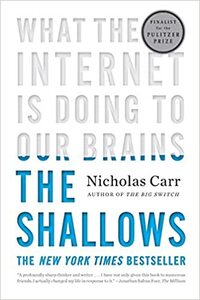Take a photo of a barcode or cover
I'm not too much of a fan of the "quickly gloss over all of human history to make your point" approach, which is what most of the first half of the book is, but he does make some great points later, so all is well. A good case for continuing to read books, write, and engage in deep thought.
_The Shallows_ is one of the better books in the "the digital age is ruining our brain" category. I particularly enjoyed his historical overviews and connecting the internet phenomenon with the mental and philosophical changes that occurred with the conception of time and the watch, spatial understanding, and maps, along with the written word and books culminating in the rise of the internet. The foray into brain science and the plasticity of the brain helped show that everything we do changes the makeup of our brain in some way. The book's biggest weakness is not necessarily a weakness that it can contend with, but, unfortunately, it's dated. The chapter on "The Web" or "The Net" shows its age. The problem we are facing now isn't just the proliferation of information at our fingertips but the assault of our attention from tech companies. If everything is as wrong as Cole argues that it was many years ago, the situation is only that much worse today, which I agree with. While I'm sure this book changed lives and the course of conversation years ago, it is now more helpful in the historical category in this conversation on our attention and brain makeup due to "The Web." If you're looking for a current book to understand our current situation, there are more helpful ones in this category, such as Stolen Focus. Check this book out if you're interested in the historical argument but not necessarily in the current discussions.
Written in 2009 with me reading it in 2018 obviously a lot of the references are pretty outdated but the main content is still relevant. It's a great view of how past technologies changed our brains... which winds up, as he admits, basically negating the thesis of the book. Read it as an enjoyable history, don't read it to gain momentum for your vendetta against social media. haha
A very interesting book about another way the internet is fucking us up. It explains what most of us were already thinking, talking in great detail about the Net has literally changed our brains and destroyed our attention spans. I guess it really is TikTok's fault. Unfortunately, it doesn't suggest changes or any ways for us to save ourselves, but I guess that goes to show there isn't much we can do.
All in all, "In The Shallows" is a good read, even if it is a bit repetitive. You will at least come out of it knowing a bit more about slugs.
All in all, "In The Shallows" is a good read, even if it is a bit repetitive. You will at least come out of it knowing a bit more about slugs.
As humans whose attention is being sold to these data-mining websites, it is imperative that we can identify and understand the way technology is affecting us. Nicholas Carr shares how the internet has changed not only the way we communicate with one another but also how it is quite literally “rewiring” our brains. With scientific confirmation that human brains display neuroplasticity, this proves that brain physiology actually changes in response to its environment. Our attention span has drastically decreased as has our ability to remember information. With everything on the internet, we no longer need to retain information because we have everything at our fingertips 24/7. Being that this book was published in 2010, many changes have taken place in the last 14 years. It is not uncommon for the average person to spend 8 hours or more looking at their phone. This screen time also extends to time on computers and time spent streaming the latest Netflix series. So, as I read this book, I constantly reminded myself that things are much worse now than previously thought. Nevertheless, this was an insightful reflection on the direction of technology’s progression within our lives.
Could have been an essay. I don't know if I just have lost my attention span because of the internet though!
This book was pretty good. I went into it expecting some "how to avoid what the internet is doing to our brains", but it ended up being more "here's what it's doing and here's how inventions throughout history have been changing our brains too." Fascinating stuff at any rate. Lots of facts, figures, statistics, and some history in there too.
**4.5 stars**
Holy shit. What did I just read?
I am horrified. I am shooketh. I am intrigued. I am educated. I am validated.
I picked up this book because my curiosity has been leading me to explore the darker side of our tech tools and comforts. Much like Carr, I've noticed that how I read books has changed over the past decade or so, and in a rather horrifying way.
It used to be that I could fall, like Alice down the rabbit hole, into a book and not resurface for hours on end, the whole time believing that the book's world was my own. Nowadays, it's a staccato stutter-step kind of experience. I read two or three pages and stop. I need to look something up. I need to write something down. I need to check Instagram. I need to remind myself where I'm at on my Goodreads book challenge. It's miserable. It's new. And I can't seem to stop myself. Why? This book provides some intriguing theories.
In thinking about the coming year and the things I'd like to do differently, reshaping my relationship with technology ranks at the top of that list. I'd prefer, for starters, for me to control it and not vice-versa. This book, coupled with Catherine Price's How To Break Up With Your Phone have, in a pretty spectacular way, called attention to something I've long known has been an issue.
I want to think deeply again. I want to get lost in the pages of my books. I don't want to be, as Carr writes, "a compulsive nibbler of info-snacks." Retraining my brain will be a long and difficult task, but this book has shocked me into readily accepting that challenge. (Note: while I was reading this I could envision the people in my life who would vehemently and violently disagree with much that Carr has to say. I think this only makes it all the more worth reading).
There are so many fascinating ideas presented that I can't even begin to delineate them all in this small text box. If you, like me, are wondering how technology might be changing you, then give this book a go. Carr's writing is magnificent. He's got a bit of a flare for the dramatics, and at times he leans towards what some might call pretentious, but I found his voice to be elegant, rich, and deliciously charged with a conviction that aligns all too well with my current experience.
Holy shit. What did I just read?
I am horrified. I am shooketh. I am intrigued. I am educated. I am validated.
I picked up this book because my curiosity has been leading me to explore the darker side of our tech tools and comforts. Much like Carr, I've noticed that how I read books has changed over the past decade or so, and in a rather horrifying way.
It used to be that I could fall, like Alice down the rabbit hole, into a book and not resurface for hours on end, the whole time believing that the book's world was my own. Nowadays, it's a staccato stutter-step kind of experience. I read two or three pages and stop. I need to look something up. I need to write something down. I need to check Instagram. I need to remind myself where I'm at on my Goodreads book challenge. It's miserable. It's new. And I can't seem to stop myself. Why? This book provides some intriguing theories.
In thinking about the coming year and the things I'd like to do differently, reshaping my relationship with technology ranks at the top of that list. I'd prefer, for starters, for me to control it and not vice-versa. This book, coupled with Catherine Price's How To Break Up With Your Phone have, in a pretty spectacular way, called attention to something I've long known has been an issue.
I want to think deeply again. I want to get lost in the pages of my books. I don't want to be, as Carr writes, "a compulsive nibbler of info-snacks." Retraining my brain will be a long and difficult task, but this book has shocked me into readily accepting that challenge. (Note: while I was reading this I could envision the people in my life who would vehemently and violently disagree with much that Carr has to say. I think this only makes it all the more worth reading).
There are so many fascinating ideas presented that I can't even begin to delineate them all in this small text box. If you, like me, are wondering how technology might be changing you, then give this book a go. Carr's writing is magnificent. He's got a bit of a flare for the dramatics, and at times he leans towards what some might call pretentious, but I found his voice to be elegant, rich, and deliciously charged with a conviction that aligns all too well with my current experience.
What an interesting question...hey look, a cute picture of a cat...





